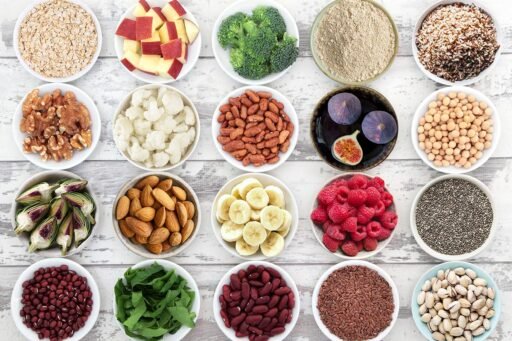Detoxing for Better Skin: How Clean Eating Can Help Clear Your Complexion
The connection between diet and skin health is often underestimated, but it’s more important than many people realize. While skincare products and routines certainly play a role in achieving glowing skin, what you put into your body has an even more profound effect on the health and appearance of your complexion. Clean eating, or consuming nutrient-rich, whole foods while eliminating processed and inflammatory options, can help to detoxify your skin from the inside out. But how exactly does clean eating support clear skin?
In this article, we’ll explore the powerful link between diet and skin health, and how detoxing through clean eating can help you achieve a clearer, more radiant complexion.
The Science Behind Clean Eating and Skin Health
Your skin is your body’s largest organ, and just like the liver or kidneys, it plays an essential role in detoxifying the body by expelling waste products through sweat. However, what you consume can either support or hinder your skin’s ability to stay clear and healthy. Inflammation, hormonal imbalances, and toxins in the body often manifest on the skin, showing up as acne, eczema, rashes, and dullness.
Clean eating—focused on whole, nutrient-dense foods—helps to reduce inflammation, stabilize blood sugar levels, improve gut health, and provide the body with the vitamins and minerals needed for optimal skin function. Here’s how clean eating can contribute to a clearer complexion:
1. Reducing Inflammation for Clearer Skin
One of the main culprits of skin issues like acne, eczema, and rosacea is inflammation. When the body is in a state of chronic inflammation—often due to poor diet, stress, or environmental toxins—it can trigger skin flare-ups. Processed foods high in sugars, unhealthy fats, and refined carbohydrates are known to contribute to inflammation, leading to breakouts and skin irritation.
Clean eating focuses on reducing these inflammatory triggers by eliminating processed foods and opting for whole, anti-inflammatory ingredients such as:
- Leafy greens (spinach, kale, and arugula) rich in antioxidants that help to fight inflammation.
- Berries (blueberries, strawberries, raspberries) that contain vitamin C and antioxidants, which help reduce redness and irritation.
- Fatty fish (salmon, mackerel, sardines) high in omega-3 fatty acids, known to calm inflammation in the body.
By focusing on anti-inflammatory foods, you help to calm internal processes that may lead to inflammation-based skin issues.
2. Balancing Blood Sugar Levels
Fluctuating blood sugar levels can trigger insulin spikes, which in turn can promote the production of excess sebum (oil) in the skin. This excess oil can clog pores and lead to acne breakouts. In fact, diets high in refined sugars and carbohydrates are often associated with an increased likelihood of developing acne.
When you adopt a clean eating approach, your diet typically includes foods that stabilize blood sugar, such as:
- Whole grains (brown rice, quinoa, oats), which are high in fiber and release glucose more slowly into the bloodstream.
- Healthy fats (avocados, olive oil, nuts), which provide satiety and help prevent blood sugar spikes.
- Low-glycemic fruits (apples, pears, and berries), which don’t cause rapid spikes in blood sugar.
By stabilizing your blood sugar levels, you prevent the hormonal fluctuations that often lead to acne and promote clearer skin.
3. Supporting Gut Health for Glowing Skin
The gut-skin axis is an emerging area of research, revealing that the health of your digestive system can significantly influence the health and appearance of your skin. A balanced, healthy gut microbiome is essential for nutrient absorption, detoxification, and reducing systemic inflammation. On the other hand, an imbalanced gut (often caused by a poor diet or excess sugar) can lead to skin problems like acne, eczema, and rosacea.
Clean eating promotes a healthy gut by:
- Increasing fiber intake from fruits, vegetables, and whole grains, which supports digestion and elimination of toxins.
- Including fermented foods like sauerkraut, kimchi, and yogurt that contain probiotics to support gut health and improve the microbiome balance.
- Avoiding processed foods, which can disrupt the balance of healthy bacteria in the gut and increase inflammation.
A healthy gut allows the body to eliminate toxins efficiently, reducing the likelihood of them being expelled through the skin, which helps to prevent skin issues like breakouts and dullness.
4. Detoxing Your Skin from the Inside Out
When you eat clean, you are essentially supporting your body’s natural detoxification processes. Toxins, which accumulate from the food you eat, the air you breathe, and environmental pollutants, can show up on the skin in the form of acne, dullness, or other skin irritations. Clean eating helps to reduce the intake of processed foods and environmental toxins, giving your liver, kidneys, and skin the support they need to detoxify effectively.
Some detox-supporting foods to include in your clean eating plan are:
- Lemon water to help flush toxins and aid digestion.
- Cucumber and celery, which are hydrating and help flush out excess toxins.
- Green tea, which is packed with antioxidants to fight free radicals and support the detox process.
By reducing your toxin intake and boosting your body’s natural detoxification process, you help to prevent toxins from accumulating and causing skin issues.
5. Providing Essential Nutrients for Skin Repair
Your skin requires a variety of vitamins and minerals to stay healthy, repair itself, and maintain a youthful appearance. Clean eating ensures you’re getting the right nutrients to support skin health. Key nutrients for skin repair include:
- Vitamin C (found in citrus fruits, bell peppers, and leafy greens) helps with collagen production, which supports skin elasticity and prevents premature aging.
- Vitamin A (found in sweet potatoes, carrots, and leafy greens) helps to promote cell turnover, preventing clogged pores and dull skin.
- Zinc (found in seeds, nuts, and legumes) is crucial for healing acne and wounds, and it helps regulate oil production in the skin.
- Vitamin E (found in nuts, seeds, and avocados) acts as an antioxidant, helping to protect the skin from free radical damage and reducing the appearance of fine lines and wrinkles.
A nutrient-rich, whole-food diet ensures that your skin has all the building blocks it needs to maintain a healthy, clear complexion.
6. Hydration: The Cornerstone of Skin Health
While clean eating focuses on nourishing your body with the right foods, it’s also important to remember that hydration is key to maintaining healthy skin. Dehydration can lead to dry, dull, and flaky skin, and it can also make your skin more prone to irritation.
Drinking plenty of water, along with eating hydrating foods like cucumbers, watermelon, and oranges, helps to maintain skin moisture, flush out toxins, and improve the skin’s elasticity.
Tips for Detoxing for Better Skin
- Start your day with water: Kickstart your detox by hydrating first thing in the morning with lemon water to flush out toxins and rehydrate after a night’s sleep.
- Eat the rainbow: Incorporate a variety of colorful fruits and vegetables into your meals. Each color represents different nutrients that are essential for skin health.
- Avoid processed foods: Steer clear of packaged snacks, sugary drinks, and fast food. Instead, opt for home-cooked meals made with fresh, whole ingredients.
- Limit dairy and refined sugar: Some individuals may experience skin flare-ups due to dairy or high-sugar intake. Try reducing these foods and observe any improvements.
- Focus on healthy fats: Include sources of omega-3 fatty acids, like fatty fish, walnuts, and flaxseeds, to reduce inflammation and support skin repair.
Conclusion: Clean Eating for a Clearer Complexion
Detoxing through clean eating can work wonders for your skin, especially when paired with proper skincare and hydration. By eliminating processed foods, reducing inflammation, and providing your body with the nutrients it needs to repair and regenerate, you can achieve a clearer, brighter, and more youthful complexion.
Remember that skin health is a reflection of overall health, and the benefits of clean eating go beyond just clear skin—they contribute to better energy, improved mood, and a stronger immune system. By nourishing your body with wholesome foods, you’ll be taking the first step toward glowing, healthy skin from the inside out.































